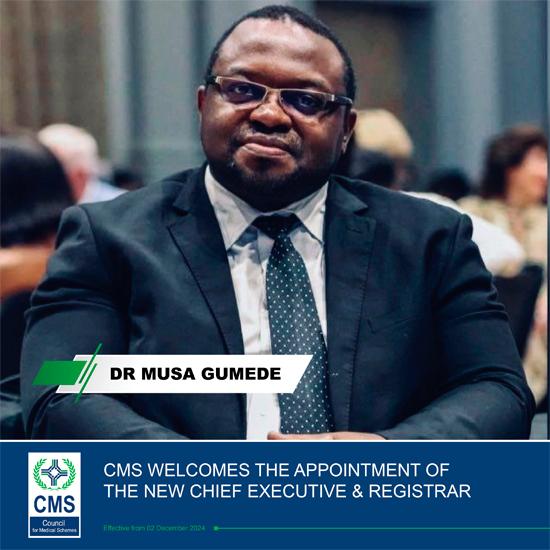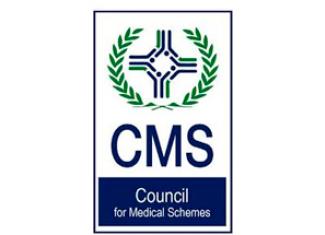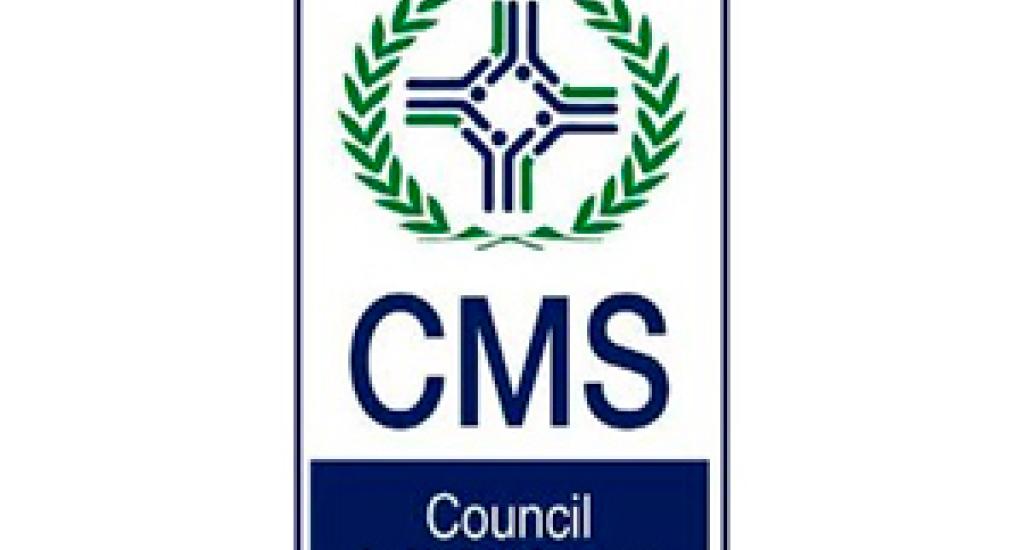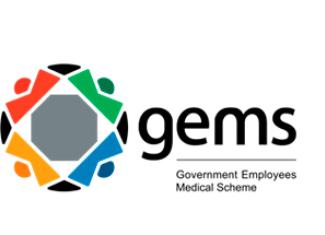New CMS CEO
committed to advancing SA's healthcare landscape

Dr Musa Gumede has taken on the role of Chief Executive Officer (CEO) at the Council for Medical Schemes (CMS), bringing a wealth of experience and an unwavering commitment to improving South Africa's healthcare landscape.
His appointment marks the beginning of a pivotal five-year tenure, during which he aims to drive significant change in the regulatory environment for medical schemes. During this period, he aims to contribute meaningfully to the country’s broader vision for universal health coverage.
Strategic plan
With his multifaceted back- ground as a medical practitioner, local government leader, and healthcare administrator, Gumede is uniquely positioned to lead the CMS at a time when South Africa is navigating complex healthcare reforms, notably the transition towards the National Health Insurance (NHI). In an exclusive interview with Public Sector Manager magazine, Gumede shared his strategic roadmap, detailing the key priorities and the goals he aims to accomplish during his tenure.
He joined the CMS in December 2024. Prior to this, he was the eThekwini Municipality’s Deputy City Manager for Community and Emergency Services. Between these two stints, he worked as Deputy Director-General at the KwaZulu-Natal Department of Health.
Gumede explained that one of his main aims is to strengthen the relationship between the CMS, medical aid schemes, administrators and brokers.
“As a regulator, we must be partners, not adversaries…we must break down the barriers between us and the industry to create a collaborative environment where everyone is working together toward the common goal of improving healthcare access”, he said.
The newly appointed CEO’s goal is to establish the CMS as a trusted partner for medical schemes, fostering open communication, transparency and mutual respect. This will require building a relationship of trust, ensuring schemes are receptive to the regulator’s input.
"We need to make sure that the schemes are clear on our mandate to protect the public, while also ensuring that we respect the operational autonomy of the schemes,” he said.
Growing membership
Gumede is committed to increasing medical scheme membership beyond the current 9 million beneficiaries, a number that has seen minimal growth in recent years. He is of the view that expanding access to medical schemes is crucial for South Africa's progress toward universal healthcare coverage.
“There are a lot of people who can afford medical scheme coverage but are not enrolled, and that is where we need to start. We need to look at how to make the benefit packages more appealing to those who can afford them.”
The key to achieving this growth, Gumede believes, lies in offering a broader range of benefits, without raising costs.
“We need to find a way to offer more comprehensive benefits while keeping the costs reasonable. If we can do this, we will not only grow the membership but also benefit the public and medical schemes alike,” added Gumede
Role of the CMS in the NHI
As South Africa gears towards the implementation of the NHI, Gumede recognises that the CMS must evolve and recalibrate its role.
He explained that the Medical Schemes Act of 1998, currently grants the CMS regulatory authority over medical schemes. However, he noted that Section 33 of the Act suggests that medical schemes will have a complementary role to play in the NHI environment.
“This presents a challenge, as we need to determine how the CMS can continue to regulate and support the schemes within the new framework,” he said.
According to Gumede, the CMS will continue to be a crucial and effective entity as the country transitions to universal healthcare.
“Our role will continue to grow, and we will need to find a way to ensure the sustainability of
medical schemes within the NHI system,” he noted.
Good governance
Gumede’s tenure will prioritise enhancing corporate governance, ensuring that the CMS meets all statutory requirements while striving for a clean audit in the years to come.
“We are not yet qualified for a clean audit, but it is something we aspire to achieve,” said the CEO.
“Ensuring good governance is crucial for the CMS, especially as we work to protect the interests of the public and oversee the medical schemes industry. We need to demonstrate to the public that we can be trusted to regulate this sector effectively”.
Gumede envisions a more transparent healthcare industry. One of his goals is to create a platform that allows the public to compare the benefits across various medical schemes, helping them make informed decisions about their healthcare coverage.
“Currently, the public struggles to compare schemes because the information is not always clear or accessible. We aim to develop a platform where people can compare medical schemes and see which ones
offer the best benefits for their needs, ” explained Gumede.
Advocating for better funding and resources
One of the challenges that Gumede has already identified is the regulator’s current funding model, which he believes limits its ability to fulfil its mandate.
“We are dealing with a billion-dollar industry, but our funding model does not allow us to do as much as we should,” he explains.
“We should be offering more assistance to medical schemes, conducting more visits, and providing educational support to members. However, we are constrained by our current budget”.
To address this, the CEO intends to lobby for increased funding through levies or other mechanisms, adding that with more resources, the CMS could significantly enhance its over-sight capabilities.
Gumede emphasised the importance of public engagement to ensure that individuals understand their medical scheme benefits.
“We do roadshows where we educate people about the benefits they are paying for…this is crucial because members need to know how to access their benefits and use them effectively.
“This kind of education is essential for creating a more informed public and ensuring that people are not just paying for coverage, but are also receiving the benefits they deserve” he concluded.






